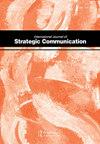了解谁应该为COVID-19负责:阴谋论信仰的动态、归因、感知到的经济威胁和消费者种族中心主义
IF 1.9
Q1 COMMUNICATION
International Journal of Strategic Communication
Pub Date : 2023-10-18
DOI:10.1080/1553118x.2023.2235332
引用次数: 0
摘要
摘要本研究调查了个人关于中国在新冠肺炎大流行中的作用的阴谋论信念及其对他们对中国态度的影响。尽管在传统媒体和社交媒体上传播了许多关于中国的阴谋论,但很少有人知道这是如何影响个人对中国在COVID-19大流行中的责任的看法以及这种观点的影响。2021年10月,对521名澳大利亚公民进行了一项具有全国代表性的在线调查。调查结果显示,相信关于中国在导致COVID-19大流行中所起作用的阴谋论的个人(a)将责任归咎于中国,(b)将中国视为对澳大利亚的经济威胁,以及(c)对澳大利亚产品的偏好高于中国产品。这项研究将有助于战略沟通的学术研究和实践,对特定群体在危机期间如何以及为什么发展或采用阴谋论信念有重要的见解。披露声明作者未报告潜在的利益冲突。注1:学者们将“阴谋论信仰”一词与其他术语交替使用,如“阴谋论信仰”。本文章由计算机程序翻译,如有差异,请以英文原文为准。
Understanding Who is Blamed for COVID-19: Dynamics of Conspiratorial Beliefs, Blame Attribution, Perceived Economic Threat, and Consumer Ethnocentrism
ABSTRACTThis study investigates individuals’ conspiratorial beliefs about China’s role in the COVID-19 pandemic and their effects on their attitudes toward China. While many conspiracy theories about China had been propagated on both traditional and social media, little is known about how this affected individuals’ views on China’s responsibility in the COVID-19 pandemic and the effects of such views. An online survey was conducted with a nationally representative sample of 521 Australian citizens in October 2021. The findings showed that individuals who believed in conspiracy theories regarding China’s role in causing the COVID-19 pandemic (a) attributed blame to China, (b) perceived China as an economic threat to Australia, and (c) exhibited stronger preferences for Australian products over Chinese products. This study will contribute to strategic communication scholarship and practice with key insights into how and why specific groups of individuals develop or adopt conspiratorial beliefs during a crisis. Disclosure statementNo potential conflict of interest was reported by the author(s).Notes1 Scholars use the term conspiratorial beliefs interchangeably with other terms, such as beliefs in conspiracy theories.
求助全文
通过发布文献求助,成功后即可免费获取论文全文。
去求助
来源期刊

International Journal of Strategic Communication
Social Sciences-Sociology and Political Science
CiteScore
3.40
自引率
0.00%
发文量
39
期刊介绍:
The International Journal of Strategic Communication examines the philosophical, theoretical, and applied nature of strategic communication, which is “the purposeful use of communication by an organization to fulfill its mission.” IJSC provides a foundation for the study of strategic communication from diverse disciplines, including corporate and managerial communication, organizational communication, public relations, marketing communication, advertising, political and health communication, social marketing, international relations, public diplomacy, and other specialized communication areas. The IJSC is the singular forum for multidisciplinary inquiry of this nature.
 求助内容:
求助内容: 应助结果提醒方式:
应助结果提醒方式:


